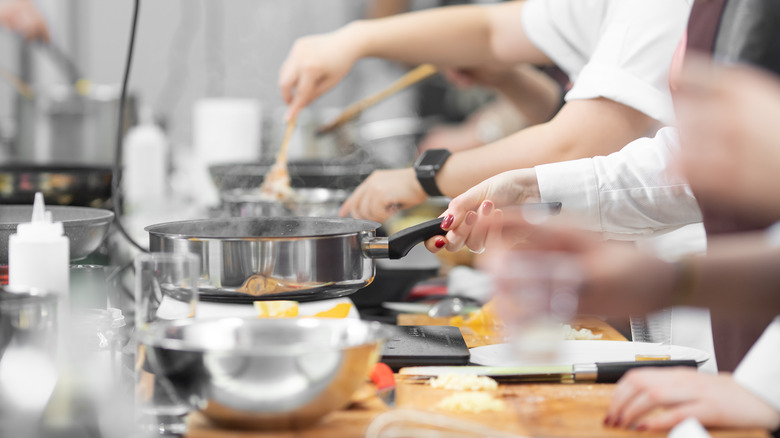Culinary Students Have A Question About The Biden Student Debt Plan
The typical American college student who takes out a student loan is likely to graduate with upwards of $37,000 in debt, which in February of 2022 rounded out to over $1.5 trillion nationwide (per The Economist). With the average public university tuition clocking in at well over $32,000 (per Education Data Initiative), only a lucky few can afford to attain a bachelor's degree without private or federal assistance. The New York Times has an entire section dedicated to student debt, from professional advice to horror stories to news updates on relief strategies.
One such update came this week when President Biden announced his student loan forgiveness plan that will cancel up to $10,000 of student loan debt for single applicants that make under $125,000 (and married applicants that make under $250,000), plus an extra $10,000 for the 27 million students who qualified for Pell Grants (per The New York Times). While the plan certainly doesn't begin to cover the entirety of student debt in the country, it still lifts some weight off the backs of millions of Americans.
But what about culinary school grads? Back in 2013, a few weeks after Culinary Institute of America students staged a walkout to protest staggering debt and "weakening academic standards," Eater shared the annual cost of 11 "basic culinary arts programs" around the country. The numbers were staggering even then, so you better believe those tuitions have increased in the last decade. Here's how Biden's relief plan will affect the debt of budding chefs.
Many cash-strapped culinary grads are not eligible for federal relief
While many college grads who received student loans through federal programs are qualified for President Biden's relief package, those who took out loans through private banks are not, nor are those who took out a Federal Family Education Loan (per The New York Times). Debt-saddled culinary grads, whose tuitions may have been up to three times higher than those of their friends who attended public universities (per Eater), are strongly in need of the kind of assistance promised by the Biden program. Unfortunately, they might not qualify either.
"Because tuition often exceeds the maximum amount that the federal government allows students to borrow each year, private loans are often used to fill the gap," explains Eater, adding that some private culinary schools "aren't eligible to receive federal funds at all." The only culinary grads who might be eligible for federal relief are the ones who attended culinary arts programs at a public university, community college, or "accredited private institution."
Instead of a federal program, those with a degree (and lots of debt) from private culinary institutions may have to continue to take one-in-million chances on private contests, like the Wallaby Culinary Dream Contest that awarded just two culinary grads with $15,000 in relief in September 2021 (per Forbes). Some institutions, like Le Cordon Bleu, offer their own debt forgiveness programs for federal and private loans.

